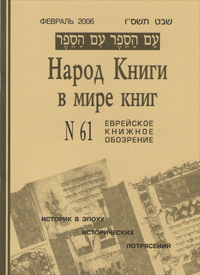The People of the Book in the World of Books is a Russian bimonthly publication for serious readers with Jewish interests. Our English website includes only the summaries of the published articles. To access the complete text of them, please visit the Russian version of this website.

|
||
|
This issue of the magazine includes:
• Review: Historian at the Age of Historical Upheaval
A historian, who dedicated his life to the research of the past, is also a character of the history of his own times. No wonder that personal experience is often makes an influence on the perception of the old ages. Sometimes the current reality checks not only analytical abilities of a historian but also his personal courage, endurance, ethical qualities. As an example to this can be seen the life of Solomon Lurie (1890–1964), distinguished Soviet historian, specialist on ancient Greek philosophy and literature. His biography was written in the 1980s by the son, Yakov Lurie (1921–1996), also a prominent historian, author of many works on literature and thought of medieval Russia. The manuscript was secretly forwarded to the West and published under the pseudonym in Paris in 1987. Only in 2004 the book was published under the real name of the author by the St. Petersburg European University.
Life of Solomon Lurie started at the age of the Pale of Settlement, educational quotas and other legal limitations for Jews. Being absolutely indifferent to any religion, in order to get possibility to work as a historian he had to convert to Christianity but it didn’t protect him from anti-Semitic manifestations (after February revolution of 1917 he returned back to Judaism). Deeply impressed by his own experiences as a Jew in Russian Empire Solomon Lurie wrote his famous book Anti-Semitism in the Ancient World (1922). This significant scholarly work was based on thorough research of all available materials but also has clear personal motives. Later, during Stalin’s campaign against “Cosmopolitanism” Solomon Lurie was expelled from the Leningrad State University. In order to get a job he had to move to Odessa, then to Lvov where he died—far from his natives and from his beloved Leningrad/St. Petersburg.
The reviewer analyzes the fate of Solomon Lurie, as well as of his son, their moral choices in different periods of Russian history, and their attempts to save their honest names in the most difficult circumstances.
• Looking Through Russian Literary Magazines: Novels and Articles of Jewish Interest
• Jewish Calendar of Significant Dates: March–April 2006
• Bibliography: 60 New Books |


